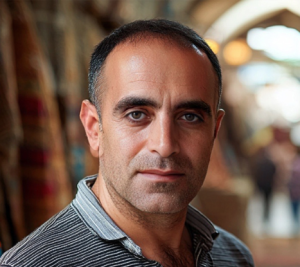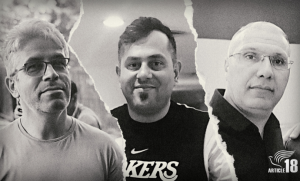 Twelve Christian converts, one of whom is currently in detention (Javad Amini, pictured), were summoned to appear at the 1st Branch of the Revolutionary Court of Nowshahr on 26 November after Prosecutor Mohammad Reza-Ebrahimi noted in his indictment that they had “identified themselves as Christians during their defence”. Nowshahr is a port city on the Caspian Sea coast in northern Iran’s Mazandaran province.
Twelve Christian converts, one of whom is currently in detention (Javad Amini, pictured), were summoned to appear at the 1st Branch of the Revolutionary Court of Nowshahr on 26 November after Prosecutor Mohammad Reza-Ebrahimi noted in his indictment that they had “identified themselves as Christians during their defence”. Nowshahr is a port city on the Caspian Sea coast in northern Iran’s Mazandaran province.
The twelve converts were among over twenty Christians first arrested by Ministry of Intelligence agents in Nowshahr and neighbouring Chalus in coordinated raids on their homes in the early hours of 26 December 2023. They were accused of “establishing house-churches”, “propagating Christianity” and following a “religion disturbing to the holy religion of Islam”. The Christians were released on bail after between two and five weeks’ detention and were prohibited from leaving Iran for the next six months. In May some of their family members were summoned for prolonged interrogations, during which they were threatened and insulted.
 In September, agents of the Islamic Revolutionary Guard Corps (IRGC) re-arrested three of the Christians, Jahangir Alikhani, Hamed Malamiri and Gholam Eshaghi (pictured, from left) and detained them for nearly two months in a detention centre in Sari, capital of Mazandaran province, three hours’ drive from Nowshahr. They were reportedly subjected to physical and psychological torture during prolonged interrogations, and were asked to write letters renouncing their Christian faith and expressing remorse for their actions in order to secure their release. They were released on bail on 17 November.
In September, agents of the Islamic Revolutionary Guard Corps (IRGC) re-arrested three of the Christians, Jahangir Alikhani, Hamed Malamiri and Gholam Eshaghi (pictured, from left) and detained them for nearly two months in a detention centre in Sari, capital of Mazandaran province, three hours’ drive from Nowshahr. They were reportedly subjected to physical and psychological torture during prolonged interrogations, and were asked to write letters renouncing their Christian faith and expressing remorse for their actions in order to secure their release. They were released on bail on 17 November.
That same day, Javad Amini (40) was travelling with his uncle when IRGC vehicles suddenly surrounded their car. Agents transferred them to the detention centre in Sari, confiscated Javad’s keys and let themselves into his home without knocking, terrifying his wife and 10-year-old daughter. His wife was later interrogated. Javad’s uncle has not been named and is understood to have no connection to the case.
In October the twelve Christians were summoned to the prosecutor’s office to submit their defence against charges of “propagating a religion contrary to Islam” and “collaborating with foreign governments”.
In the indictment summoning the twelve converts to court, Prosecutor Mohammad Reza-Ebrahimi described them as “Shia Muslims”, but wrote: “They have identified themselves as Christian during their defence, and this is supported by the messages exchanged in their phones” and by “Gospels and other Christian literature found in their possession”. He concluded that they had “set up groups to teach the Christian religion” and were therefore guilty of a crime.
The charges against the Christians have been brought under the amended Article 500 of Iran’s penal code, under which several Christians have already received long prison sentences.
(Article 18)
